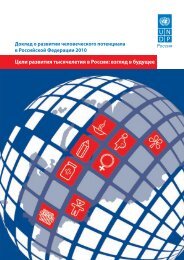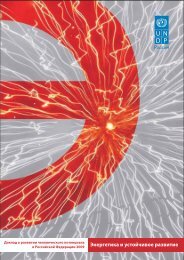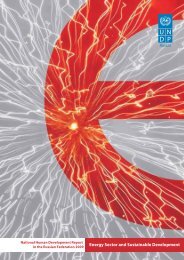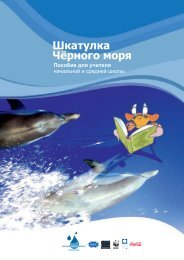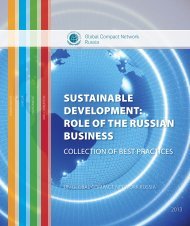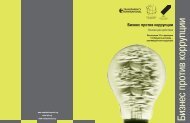Report - UNDP Russia
Report - UNDP Russia
Report - UNDP Russia
Create successful ePaper yourself
Turn your PDF publications into a flip-book with our unique Google optimized e-Paper software.
efficiency need to be include in investment andproduction programmes of energy suppliersand of government-regulated organizations.Minimum fuel efficiency requirements for newpower stations should be included ininvestment contracts: the minimum level forgas-fired stations should be raised to 60% by2015–2020, and the minimum for new coalfiredstations should be 48%. The share of<strong>Russia</strong>n heat output supplied by fuel-firedpower stations should rise to 44% in 2006–2010and 51% in 2020, while losses in electricity gridsshould be reduced to 7-8%.Government tariff policy in the past fewyears has helped to promote energy efficiency,but there is still room for improvement ofpricing processes to stimulate energy saving,and introduction of a carbon tax or a tax onharmful emissions is worth considering.Anticipated tariffs in 2010 will raise the ‘market’share in energy efficiency potential to 70%, andfuture introduction of heavy penalties foremissions or of a carbon tax could raise theshare to 92%. Energy tariffs should increasetogether with the ability of consumers to pay,and this ratio should be set in a way thatencourages energy efficiency. There needs tobe improvement of forecasting procedures forestimating future energy balances, takingaccount of expected outcomes of energysaving activities, as well as improvement ofmodeling of energy markets and relationshipsbetween market players. Tariff plans shouldoffer economic motivation for raising of energyefficiency.Long-term tariff regulation parametersshould enable inclusion of mandatory energysaving activities and actions for increasingenergy efficiency of consumers in investmentbudgets, as well as allowing governmentregulatedconsumers to use the savings achievedby their energy saving activities over a period ofat least five years.It is important to assess possibility andadvisability of introducing increased emissiontaxes and a carbon tax. Funds raised from suchtaxes and from sales of GHG emission quotas,including those received as ‘green investments’could be used to finance government actionsfor increasing energy and environmentalefficiency.A part of energy suppliers’ investmentprogrammes should be supported throughbuying out of inefficient energy capacity andextra energy from consumers. The situation wherethe main task of the energy supplier is to sell asmuch energy as possible needs to be replaced bya situation where the main goal is to provideessential energy services (comfort, lighting,transport, etc.). Such a system could use so-called‘white certificates’, proving certain energy savingachievements and based on existing practicessuch as the emissions market or the ‘greencertificate’ system, which are used in an increasingnumber of countries. Buying of electric capacityfrom inefficient consumers (which use it duringpeak periods for lighting or electrical heating)would cost only USD 20-60 per KW, whileconstruction of new generating capacity wouldtheoretically cost USD 700-1,500 per KW, but, inactual <strong>Russia</strong>n conditions, would cost USD 2,000-4,500 per KW, i.e. a hundred times more.It is important to improve the energysupply system to remote regions. Althoughdiesel power stations in remote areas producerelatively small quantities of electricity, this isthe most expensive energy in the world andsignificant budget subsidies have to be spenton it. A programme of modernization andintegration of diesel power stations withrenewable energy sources is highly importantfor minimizing budget expenditures at all levelsand ensuring a sustainable, effective andreliable energy supply.5.10. Energy efficiencyin <strong>Russia</strong>n transport networksTransport was in second place afterindustry by increase of energy consumption in2000–2007. The share of privately ownedautomobiles in total passenger transport hassharply increased, which has greatly reduced100 National Human Development <strong>Report</strong> in the <strong>Russia</strong>n Federation 2009



